Police evidence 'not relevant'
Page 24

If you've noticed an error in this article please click here to report it so we can fix it.
• Epping magis trates have cleared Heavy Haul (Chelmsford), and its managing director Philip Dyke, of a series of alleged offences involving the carriage of a collapsible workshop and ordered the defence costs to be paid out of public funds.
The company and Dyke denied using a vehicle with an overwidth and insecure load, without a test certificate, and when the tachograph had not been checked in the past two years.
Police constable Chapman said he had stopped the vehicle, which was being driven by Dyke along the M25. The load was secured by a series of webbing straps, some rope and a chain. The webbing straps were fastened to the rope hooks and were not sufficient to restrain the movement of the load. the load.
In particuThe width of the load was lar, there measured using the rope was noth ing to with which theyhad been prevent it ••
moving towards the front of the vehicle if there was heavy braking.
Together with a colleague. PC Chapman had measured the width of the load and they found that it was not less than 2.95m at the base, and in his view it was wider at the top. He examined the tachograph and there was no evidence of it having been tested in the past two years. The vehicle had no test certificate.
Questioned by Jonathan Lawton, defending, PC Chapman admitted he had not stopped the vehicle but had followed it into a layby as they were towing a disabled vehicle from the hard shoulder of the motorway. The width of the load was measured using the rope with which they had been towing the disabled vehicle, and he made pen marks on the rope. He did not know the weight of the load or the safe working loads of the webbing straps and rope hooks. He had not asked the driver the date of the last tachograph check or asked to see a test certificate.
Dyke said he had run the company since 1974 during which time there had been no convictions. Heavy Haul specialised in the carriage of abnormal and awkward loads. He had carried the collapsible workshop, which weighed about nine tonnes, on previous occasions. The safe working load of each of the rope hooks was one tonne, so there had been 22 tonnes of restraint. The tachograph had been tested in the past two years and, if he had been asked, he would have been able to produce the calibration certificate and the vehicle's test certificate.
Lawton argued that the police officer had not made a single relevant inquiry into the load, which was more than adequately secured. The method used to measure the width of the load was unsatisfactory Dyke's company had a remarkable record, and he was entitled to expect that his evidence, which in any real terms had not been challenged, should be accepted.
wing the disabled vehicle




















































































































